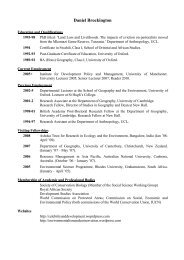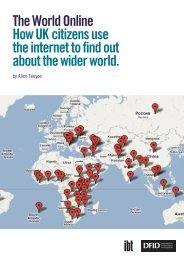World
Viewing the world - Full report
Viewing the world - Full report
- No tags were found...
You also want an ePaper? Increase the reach of your titles
YUMPU automatically turns print PDFs into web optimized ePapers that Google loves.
international economics. It was also felt in the groupsthat there needed to be more discussion, in all kinds ofmedia formats, of the implications of writing off debt.This was necessary for the respondents to make moreinformed judgements. Some participants commentedthat if debt relief was going to cost them individually alot of money then they would have to rethink theirposition.This raises important questions about how thecurrent debate on debt relief is reported on television.For example, it was reported recently that ‘cancelling thedebt will cost British tax payers £640 million over 20years’. (BBC1 1800, 21/12/99). To a great many peoplewith little knowledge of how the national economy orinternational finance works this may sound like asignificant personal cost. But another way of expressingthis amount might have been that it will cost each personin Britain around 50 pence a year for the next 20 years:not a great deal of money when spread over a long timeperiod.Broadcasters should be encouraged to think morecarefully about the presentation of a complex issue likedebt relief, especially given the public concerns identifiedin this study and the evident capacity of the media toinfluence viewers’ opinions.D.2.3.5. CookeryThis programme area seemed to bring out the mostpositive comments about the developing world.Respondents who watched cookery series particularlyliked them when they were about the food of differentcultures. Some respondents suggested that this wasprobably the only time they saw ‘good’ images of othercountries. They also felt that these programmes could beused to offer more information on cultural or politicalaspects of a particular country. It was also mentionedthat this programme area was the only one apart fromholiday and travel programmes where viewers sawregions of the world like the Caribbean or Latin America.D.2.3.6. ConclusionsA broad range of interest in media coverage ofdevelopment issues was expressed in this study, rangingfrom people who were literally switched off from thesubject (about 20% of the whole sample) to those with avery active interest (about 15% of the sample).The response amongst children, for example, wasvaried. This exchange shows some level of interest:1st: Sometimes I watch [television] because I think itmight help me, but other times I watch it because I aminterested in what it is talking about.2nd: It gives you information that shocks you sometimesand you think ‘oh, I didn’t realise that before, if it is thingsabout the developing...’Moderator: Like what? What would that be?2nd: I don’t know, like the conditions that people have towork in or live in. (15 year-olds, London)The following exchange shows a more negative attitude totelevision as a source of information:1st: It’s better to get things from books I think. You canlearn certain things from like, Newsround or Blue Peterbut not much else.2nd: Yeah, TV is for game shows and soap-operas andthings that will entertain you. I don’t like it when its getsall serious ‘cause we get enough of that in school. (15 yearolds,London).There was discussion in the groups about howtelevision coverage of development issues might beimproved by making it both more interesting and moreinformative. The need to give more context andbackground information has already been dealt withextensively. It was also suggested that the people of thedeveloping world should play a more active role instories. They should speak more (preferably in English)and should be seen to be actively helping themselves.Some group members who had already seen stories onthese lines gave a very positive response to them:I also remember watching a programme about Rwandaand it showed you this woman who had seen her husbandgetting killed by the Tutsis or the Hutsis or whatever theywere called … What she then did was instead of crumblingshe actually set up a rape crisis centre basically for otherwomen … She set it up all on her own and she was doingbrilliant. (Ethnic minority, Asian, Glasgow).It was also suggested that television might showpositive images of lifestyles in the developing world,which people in Britain could learn from:I like to sit and watch the programmes and think, they arenot worried about their mortgage. I don’t mean povertystricken people … They are not worried about their carpassing its MOT or anything. It does appeal, they have gota lot more contentment that we have. (Working class,Glasgow).Some participants also noted a need to follow upstories, to show what happens in the aftermath of a storysuch as a disaster. This might include the process ofrebuilding and reconstruction. In the absence of suchcoverage people were left with a view of the developing142 DFID – July 2000





